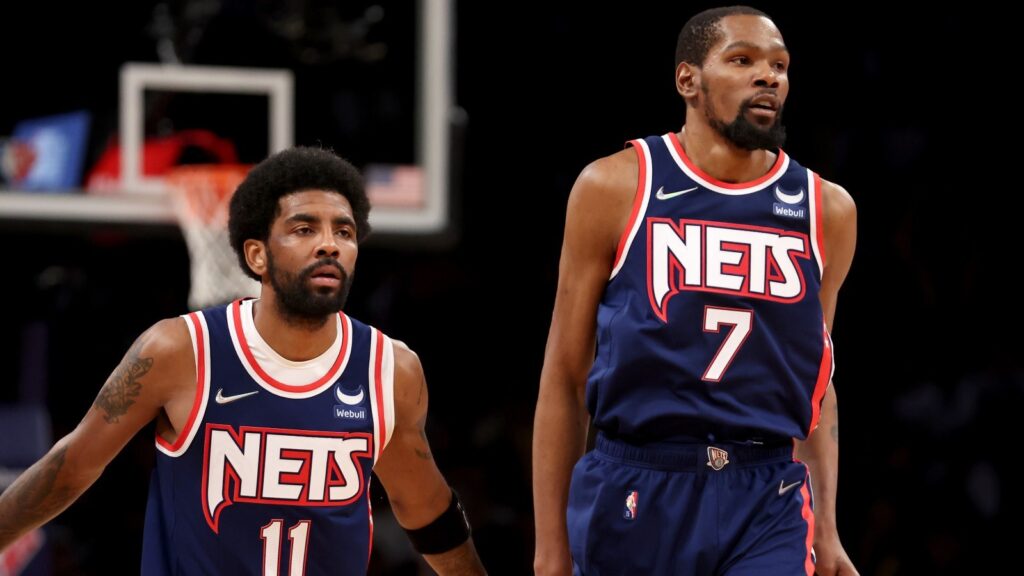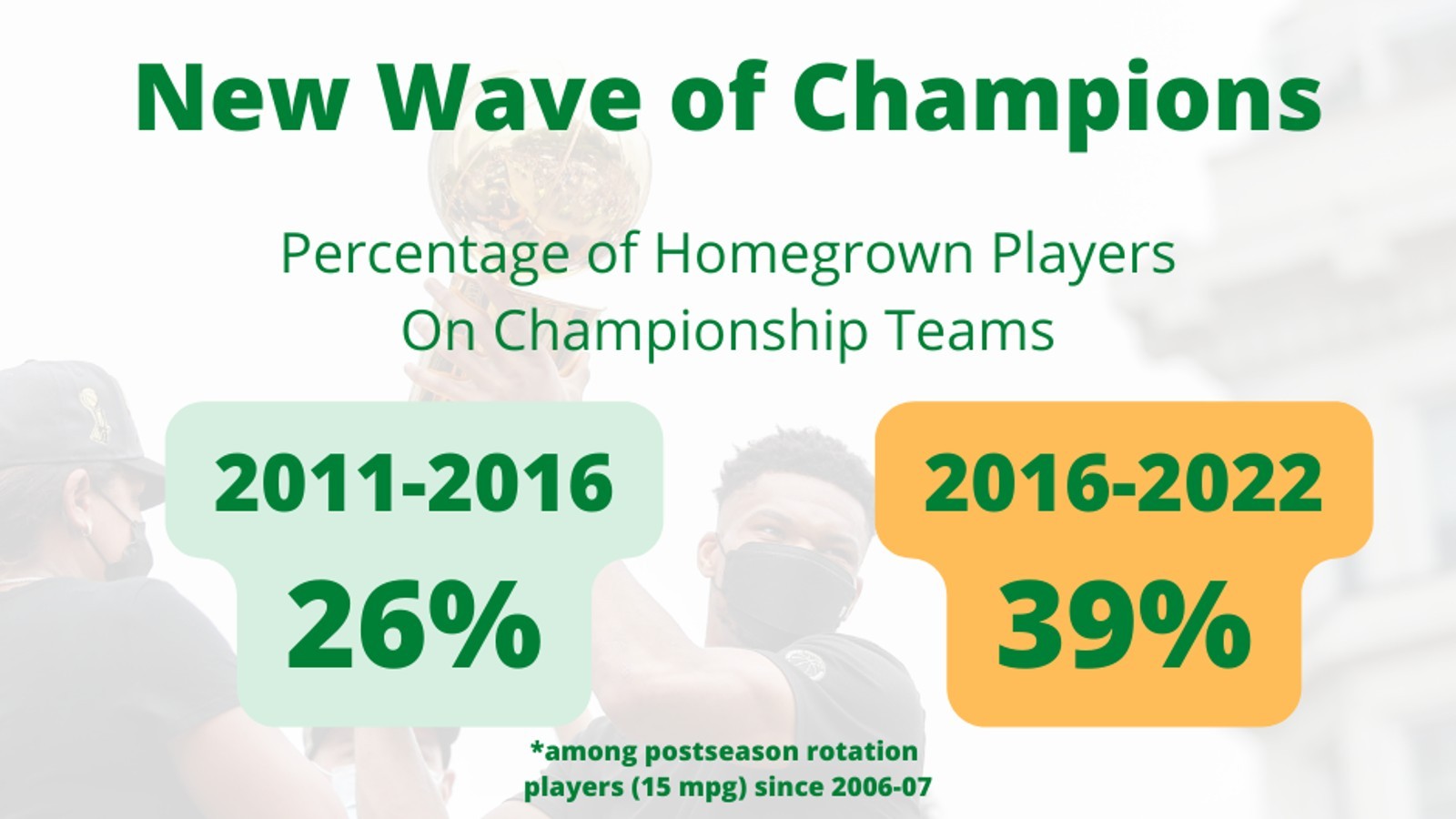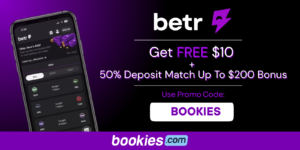Sorry Kevin Durant, The Super Team Era is Dead & The Data Proves It

Promo Code: BOOKIES
Must be 21+ to participate (18+ in KY). Gambling problem? Call 1-800-GAMBLER (CO, IL, IA, KY, KS, LA, MD, MO, NC, NJ, OH, PA, TN, VA). Call 1-800-NEXT-STEP (AZ). Call 1-800-9-WITH-IT (IN). CALL 1-877-770-STOP (LA). Must be present in LA (select parishes). Licensee partner Amelia Belle Casino. Minimum $10 deposit required. Minimum odds -500 or greater. Bonus Bets wager excluded from returns. New customers only. T&Cs, time limits and exclusions apply.
Kevin Durant's legacy “has been dead since July 4, 2016." That's according to KD himself.
It's the date he chose to leave Oklahoma City and join the 73-win Warriors. Durant, like LeBron James, got what he wanted out of his super-team experience. Two championships – two Finals MVPs. But he was vilified for the decision.
Six years later, Durant’s former Warriors teammates are coming off their most unlikely championship and Durant – stunningly - is looking for a third team to join despite signing an extension with Brooklyn last summer.
I been dead since July 4th 2016, but congrats to the dubs and my boy Steezy, a Fillmore legend, man been waitin his whole life for a parade on market st. https://t.co/LXtyvu7BwB— Kevin Durant (@KDTrey5) June 17, 2022
Durant’s power move has tossed the league into chaos, and every contender needs to seriously consider if it’s really worth making a deal for KD. Given the price, it might not be worth it these days.
Consider this: The start of the free agency period (and Durant’s trade request) took place in the wake of a Finals that featured two homegrown rosters, both of which lacked more than one star. It was a truly legendary Finals in that regard.
According to ESPN Stats & Info, Warriors-Celtics was the first NBA Finals since 1998 (Bulls-Jazz) in which each team’s top three scorers were original draft picks by their teams.
In fact, three of the past four NBA champions aren’t what you’d call “super teams.” It begs the question: Is the super team era as dead as Durant’s legacy?
To that end, Bookies.com set out to answer two simple questions: How are NBA champions built? And is the super team era over? We analyzed the postseason rotations* of the past 16 champions. Why the past 16 years? Because that goes back to the genesis of the modern day super-team era.
We looked at the following averages:
- Age of a rotation player
- Years in NBA & with the team
- All-Stars among each rotation
- Percentage of players drafted by team
- Percentage acquired via free agency
- Payroll rank
- Percentage of salary cap spent
*All stats are postseason only for players who logged a minimum of 15 minutes per game.
Key Takeaways:
- Super teams aren’t needed to win titles anymore; lately there is a greater chance things go south (Nets, Sixers, Lakers) than end in a parade
- Warriors-Celtics was the first Finals since 1998 (Bulls-Jazz) in which each team’s top three scorers were still with the team that drafted them
- 3 of the past 4 champions have been homegrown rosters
- Championship teams have included 39% homegrown draft picks since 2016, up 13% from the previous period featuring LeBron’s Miami Heat and Durant’s Warriors
- Only 4 “star” players have won a championship in the first year they were traded (and two were on the same team)
- Front offices like the Warriors, Bucks, Raptors and Suns are winning through organic roster building
Promo Code: BOOKIES
Must be 21+ to participate (18+ in KY). Gambling problem? Call 1-800-GAMBLER (CO, IL, IA, KY, KS, LA, MD, MO, NC, NJ, OH, PA, TN, VA). Call 1-800-NEXT-STEP (AZ). Call 1-800-9-WITH-IT (IN). CALL 1-877-770-STOP (LA). Must be present in LA (select parishes). Licensee partner Amelia Belle Casino. Minimum $10 deposit required. Minimum odds -500 or greater. Bonus Bets wager excluded from returns. New customers only. T&Cs, time limits and exclusions apply.
The Genesis of the Big Three
| Years | 2006-11 |
| Avg Age | 30 |
| Avg Years | 9.5 |
| Avg Yrs w/ Team | 4 |
| Avg All Stars | 1.5 |
| Avg Lottery Picks | 5 |
| % Drafted By Team | 26% |
| % Free Agents | 24% |
| Avg Payroll Rank | 5 |
| % of Salary Cap Spent | 139% |
This five-year period is critical in explaining where we stand in today’s NBA in terms of roster construction. It started with the homegrown Spurs trio of Tim Duncan, Tony Parker and Manu Ginobili sweeping LeBron’s Cavs in the Finals. LeBron had arguably the worst supporting cast ever, which led to him leaving for Miami five years later.
One thing that stands out about this period is that 50% of all rotation players were acquired via trade. The other observation? Big Threes can be taken down by singular talents that get a little help along the way.
Boston's Big Three of Paul Pierce, Kevin Garnett and Ray Allen won it all in 2008, but the late, great Kobe Bryant took them down in 2009. The Black Mamba scored 29% of his team’s points in the postseason, but he also had the help of Pau Gasol, who was second to Kobe in postseason win shares that year (per basketball-reference).
Promo Code: BOOKIES
Must be 21+ to participate (18+ in KY). Gambling problem? Call 1-800-GAMBLER (CO, IL, IA, KY, KS, LA, MD, MO, NC, NJ, OH, PA, TN, VA). Call 1-800-NEXT-STEP (AZ). Call 1-800-9-WITH-IT (IN). CALL 1-877-770-STOP (LA). Must be present in LA (select parishes). Licensee partner Amelia Belle Casino. Minimum $10 deposit required. Minimum odds -500 or greater. Bonus Bets wager excluded from returns. New customers only. T&Cs, time limits and exclusions apply.
Meanwhile, Dallas’ Dirk Nowitzki (the team’s lone All-Star that year) pulled off a similar feat in 2011 with the help of Jason Terry. Nowitzki accounted for 28% of his team’s points in the postseason in helping the Mavs knock off LeBron’s star-studded Heat team in six games.
In the end, Dallas’ stunning victory over the Heat affirmed an old truism: Sometimes experience beats talent. The average age of the Mavericks rotation was 31. Their rotation averaged 11 years in the league (and six were former lottery picks).
The King Reigns – and so do 3’s
| Years | 2011-16 |
| Avg Age | 29 |
| Avg Years | 8.6 |
| Avg Yrs w/ Team | 4.1 |
| Avg All Stars | 2 |
| Avg Lottery Picks | 4.4 |
| % Drafted By Team | 26% |
| % Free Agents | 33% |
| Avg Payroll Rank | 9 |
| % of Salary Cap Spent | 109.5% |
Let’s face it: The Heat super team, smoke machine intro and dancing included, felt like overkill from the start. But LeBron accomplished his mission in Miami.
The 9% uptick in free agent signings during this period is partially due to Miami needing to fill out its roster with low-cost veterans like Shane Battier, Mike Miller and Chris Andersen. In this instance, the quality of the bench suffered due to lack of salary cap flexibility given the hefty contracts on board.
The other trend that stood out from this era (not pictured) is that champions were relying on 3-pointers 5% more (23% of points to 28%). That's the Steph Curry effect, which has changed the NBA forever.
Yet, while this is clearly the LeBron/Steph era, the metrics show that one championship team stands out in terms of roster construction: The 2013-14 San Antonio Spurs - the team that stopped a Heat three-peat. The Spurs drafted 5/9 rotation players and that 2013-14 team had the most postseason win shares from homegrown contributors of any champion over the past 16 years.
What's more, the Spurs had the 19th-ranked payroll. San Antonio was just one of five teams to win a title without paying the luxury tax (since it was instituted in 2002)! The Spurs won that title over the Heat thanks in part to a shrewd 2011 Draft Day trade with Indiana that returned eventual Finals MVP Kawhi Leonard (who was on a rookie contract).
The most impactful trade of this particular era is rooted in the 2022 postseason. LeBron returned to Cleveland in 2014 as a free agent and shipped No. 1 overall pick Andrew Wiggins (who broke out in the Finals) to Minnesota for Kevin Love. Love, along with former No. 1 pick Kyrie Irving, was a critical piece in the Cavs’ 3-1 rally against the 73-win Warriors.
Promo Code: BOOKIES
Must be 21+ to participate (18+ in KY). Gambling problem? Call 1-800-GAMBLER (CO, IL, IA, KY, KS, LA, MD, MO, NC, NJ, OH, PA, TN, VA). Call 1-800-NEXT-STEP (AZ). Call 1-800-9-WITH-IT (IN). CALL 1-877-770-STOP (LA). Must be present in LA (select parishes). Licensee partner Amelia Belle Casino. Minimum $10 deposit required. Minimum odds -500 or greater. Bonus Bets wager excluded from returns. New customers only. T&Cs, time limits and exclusions apply.
The Rise of The Home-Grown Champions
| Years | 2016-22 |
| Avg Age | 28.6 |
| Avg Years | 8.7 |
| Avg Yrs w/ Team | 3.8 |
| Avg All Stars | 2.4 |
| Avg Lottery Picks | 3.1 |
| % Drafted By Team | 39% |
| % Free Agents | 33% |
| Avg Payroll Rank | 7 |
| % of Salary Cap Spent | 128.9% |
If the super-team era is indeed dead, its eulogy can’t be written without referencing the 2019 Finals. When Durant’s Achilles snapped, it opened the door for the scrappy Raptors – led by Kawhi - to win their first title.
If Durant doesn’t get hurt, we might be talking about the Warriors as the greatest dynasty in NBA history. Instead, it was Leonard once again preventing a three-peat. Leonard’s Raptors became the only squad in the past 16 years to win a title without a single lottery pick on the roster.
After Toronto’s title, Giannis and the small-market Bucks did what Kawhi’s Clippers failed to do (beat the Suns) and won a championship despite having just one lottery pick in its rotation - Brook Lopez.
Giannis’ Bucks are indicative of the philosophical change in roster building that is taking place currently. Championship teams are drafting better (and retaining those players).
Get this: Drafted rotation players make up 39% of title-winning teams over the past five years, a 16-year high. That's up 13% from the super-team era (the 2019-20 'bubble' Lakers are the lone anomaly in this era).
Teams are drafting well and developing players, but the fact they’re exceeding the salary cap by 129% on average since 2016 tells us, more importantly, they are paying to keep those players.
Promo Code: BOOKIES
Must be 21+ to participate (18+ in KY). Gambling problem? Call 1-800-GAMBLER (CO, IL, IA, KY, KS, LA, MD, MO, NC, NJ, OH, PA, TN, VA). Call 1-800-NEXT-STEP (AZ). Call 1-800-9-WITH-IT (IN). CALL 1-877-770-STOP (LA). Must be present in LA (select parishes). Licensee partner Amelia Belle Casino. Minimum $10 deposit required. Minimum odds -500 or greater. Bonus Bets wager excluded from returns. New customers only. T&Cs, time limits and exclusions apply.
Nothing says that more than the fact the Warriors assembled the richest roster in NBA history en route to their fourth title in eight years, without signing or trading for a max free agent (Curry is the first player in the league to sign two $200 million-plus deals).

It’s fitting that this analysis ends with the reigning champion Warriors, who continue to show the NBA how to build a roster. Former No. 1 pick Wiggins, cast aside by Cleveland and Minnesota, was clutch for them in the Finals.
Wiggins isn’t a Warrior if the front office doesn’t convince Durant to complete a sign-and-trade (to join buddy Kyrie Irving in Brooklyn in 2019), which netted D’Angelo Russell. In 2020, the Warriors traded Russell to Minnesota for – Andrew Wiggins.
Checkmate, Warriors – again. As a result, Golden State is favored to repeat in 2023 (+500 at BetMGM). It must irk the extremely thin-skinned Durant. Then, again, rumors circulated that the Warriors might be willing to part with some of their young talent to reunite with Durant. Our money says they're wiser than that.
Is the Super-Team Era Dead?
So is this the end? Is the NBA going the way of Whole Foods rather than McDonalds?
Let’s consider the Eastern Conference champion Boston Celtics, since we know the Warriors are homegrown. The Celtics started the Big Three era, which laid the foundation for their current team – in a roundabout way.
Ironically, it was again the Nets in the middle of all the action. Boston turned aging stars Kevin Garnett and Paul Pierce (and other assets) into Jayson Tatum, Jaylen Brown and eventually ... Kyrie Irving, via the now-infamous 2013 trade with Brooklyn. That trade was very unpopular for Boston at the time, but the Celtics nailed their draft picks.
That's how Boston was able to overcome the Kyrie experiment failing miserably. Kyrie also then ironically torpedoed the 2021-22 Nets season, which was a colossal failure despite the team adding James Harden via trade. The Harden trade flopping (see what we did there?) was hardly surprising, though.
Over the past 16 years, only four max salary type players have won a title the first year after being traded: Kevin Garnett, Ray Allen, Anthony Davis and Kawhi Leonard. That's it.
It all leads to one conclusion: True super teams don’t work. Every championship team in the past 16 years has had at least one home-grown superstar (save for the bubble Lakers).
A crucial element of roster building is chemistry. Ultimately, the lack of chemistry - or the erosion of it - is what contributed to the end of KD’s time in Golden State (via his memorable clash with Draymond Green).
So why mess with team chemistry if you can win a title without doing so?

RELATED: Kevin Durant Trade Odds
All-Stars like Damian Lillard, Donovan Mitchell, Chris Paul, Ja Morant, Jimmy Butler and Luka Doncic don't need two other All-Stars next to them. They can win a championship in today’s NBA without having to jump ship to another star’s team. Surround them with enough talent (something the Cavs failed to do with LeBron originally), create a good culture, and recent history has shown it can be done.
True team building results in not relying on your starters to play nearly 35 minutes a night, like LeBron's 2012-13 Heat team was forced to do.
The Heat bench accounted for just 18.7% of its scoring that year, by far the lowest amount of any champion Bookies.com analyzed over the past 16 seasons. And that's the argument against super teams: That way of team building makes your overall roster weaker.
As ESPN's Kevin Arnovitz pointed out recently, league executives seem to be wising up to the fact you can't build a sustainable roster by going the super-team route.
It’s ironic in that regard, since a weak supporting cast is what leaves superstars itching for a quick-fix championship. It worked for LeBron and Durant, two generational talents that could have won on their own with more support.
It would almost certainly work for Durant if he indeed found his way to LA as a package with Kyrie, as the rumors suggest. But it's not a viable long-term winning strategy. We can safely say the super-team era is dead, given recent history.
The biggest shock of the free agency period isn’t that the Slim Reaper is trying to revive it. The surprise is Durant is determined to try again after watching the strategy fail so miserably in 2022.
Sources: STATSPASS LLC, basketball-reference.com, NBA.com, hoopshype.com
About the Author

An editor for Bookies.com, Carl has 15 years’ experience covering sports (and sports betting) during stops at PA SportsTicker, NBC, ESPN, CBS, among others. Carl has been embedded in the sports gambling scene for two decades and loves that CT now has regulated betting.

 Free Sports Bet No Deposit: Get $10 No Deposit Bonus From Betr Now
Free Sports Bet No Deposit: Get $10 No Deposit Bonus From Betr Now  Onyx Odds Promo Code BOOKIES Get $100 Bonus in Free Picks (Feb. 21)
Onyx Odds Promo Code BOOKIES Get $100 Bonus in Free Picks (Feb. 21)  Kalshi Promo Code BOOKIES: $10 Bonus For CBB and NBA Predictions (Feb. 21)
Kalshi Promo Code BOOKIES: $10 Bonus For CBB and NBA Predictions (Feb. 21)  High 5 Casino No Deposit Bonus For FREE Play: Score New Sweeps Bonus For February 2026
High 5 Casino No Deposit Bonus For FREE Play: Score New Sweeps Bonus For February 2026  McLuck Promo Code BDC & Free SC Coins Sweepstakes Bonuses For February 21
McLuck Promo Code BDC & Free SC Coins Sweepstakes Bonuses For February 21
Comments